There are SO many ways to pick “good” SEO keywords to shoot for to optimize SEO. Here are some tips and ideas to help pick keywords that will get you website traffic from Google, including tools and formulas to use in your research!

please note :: I often recommend resources, some I receive an affiliate commission for at no additional cost to you! check out my policies here
The SEO Keyword Question
A gal asked a question today in one of the Facebook groups that I belong to…
This is probably an embarrassing question to ask, but.. Can somebody help breakdown how to know if it’s a good keyword, again? I know it’s been said.. but I’m still having trouble understanding the numbers/stats.
Amanda from Momma Ever After
So first off, no question is embarrassing if you don't know the answer! And second off, that is a GREAT question that lots of us struggle with!
What Are You Trying To Accomplish?
The very first thing we need to know is what you are trying to accomplish with your keyword research!
Say Amanda has a teeny-tiny little site without a lot of domain authority. Well, she might want to find keywords with low competition for first place and try to rank for those even if there are not a lot of searches done each month.
I have medium sized niche site that I want to get to rank for high volume keywords so I need to know the EASIEST high volume keywords I can pick that have good traffic but low competition.
Last but not least, Amanda may be trying to sell affiliate products on her site, in which case she would want to pick low volume (less searches) keywords that are EXACTLY what her people are looking for when they are ready to buy!
To do: I KNOW all of those sound really good, but take a step back and really think of ONE goal that you are going to focus on for your next 10-20 blog posts!
1. Low Competition Keywords
Low competition keywords are sometimes called “long tailed keywords“, usually meaning they are a phrase rather than a word:
Short tail = Marketing
Long tail = Etsy SEO Marketing
So let's look at some search results for these two keywords…

Marketing would be an AWESOME keyword to rank for! But if you notice, there are almost 8 and half BILLION competing websites… doh.
So the chances of me ranking for that term are slim to “never in a million years”.
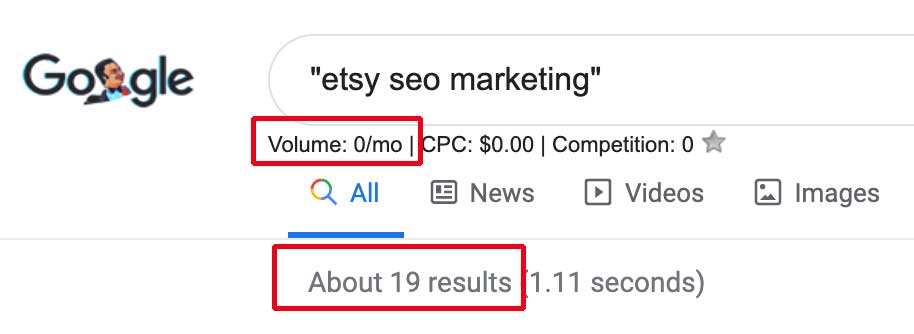
Now let's look at Etsy SEO Marketing. Yep there are 0 searches a month, but there are only 19 competing results.
I put quotation marks around that phrase to force Google to show me ONLY results that have that exact keyword in that exact order in the title or content.
But there are no searches!
I hear you screaming… why would I try to rank for a keyword with no searches?
Well, 0 searches sometimes means that there are only a few searches, which still sucks, BUT…
You notice that SEO Marketing is in that phrase, as is Etsy SEO (which I happen to rank on page one for and which gets over a 1,000 searches a month… whoo whoo!
So by trying to rank for a keyword that I KNOW I can rank number one or two for, I also get the benefit of ranking for other phrases that are relevant search terms!
And here are the 18 different keywords I rank for that include “etsy SEO”
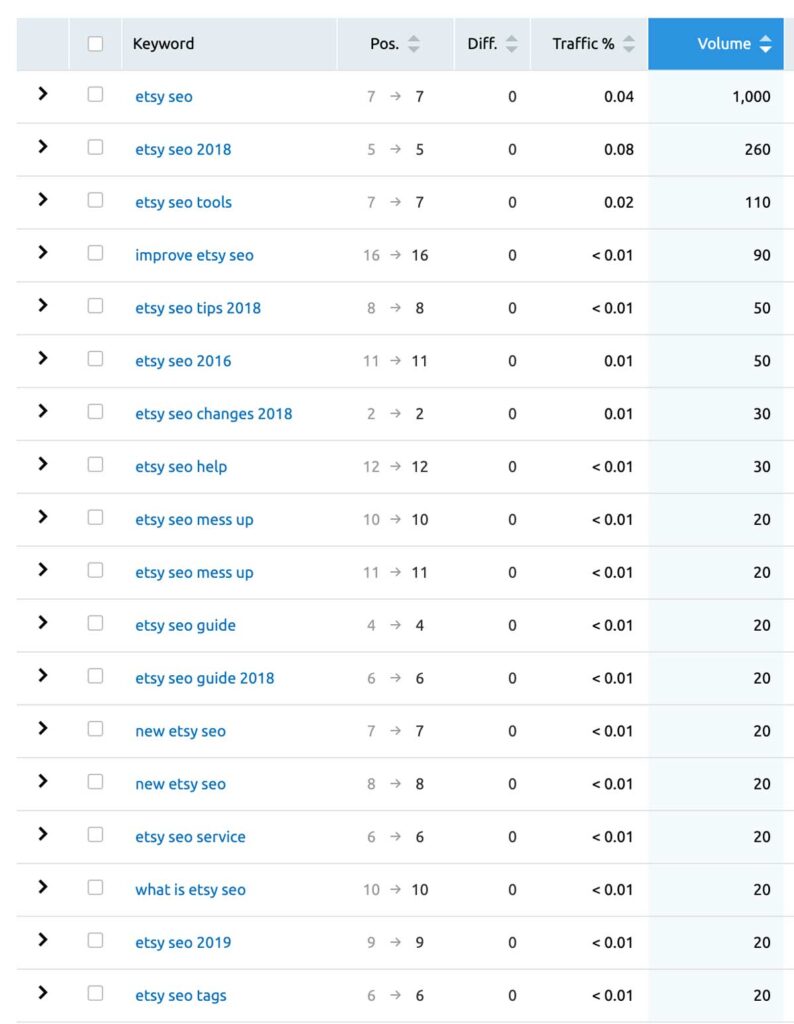
BONUS… Once you start getting keywords to rank, Google will show you other ones that you could rank for and you can write similar posts about!
Keyword Tools Used:
Keywords Everywhere – I used a free Google Chrome plugin called Keywords Everywhere to show the search volume in my searches
SEM Rush – I track my keywords in an SEO tool called SEM Rush. They have a free version and a trial full version.
2. High Volume Low Competition Keywords
Another thing we can do is look for high volume, relevant keywords that have low competition! This one takes a LOT more time! But when you create content you know it will have a chance to rank!
For my medium sized site that gets about 25K hits a month I can start going for more high volume search terms that have fewer competing sites. I have compiled a list of these that I am going to work through, writing blog posts for each one.
To do this I put Martha Stewart's site into the keyword planner tool in SEM Rush and looked at all the keywords her website ranked for that had a search volume of at least 10,000 searches a month.
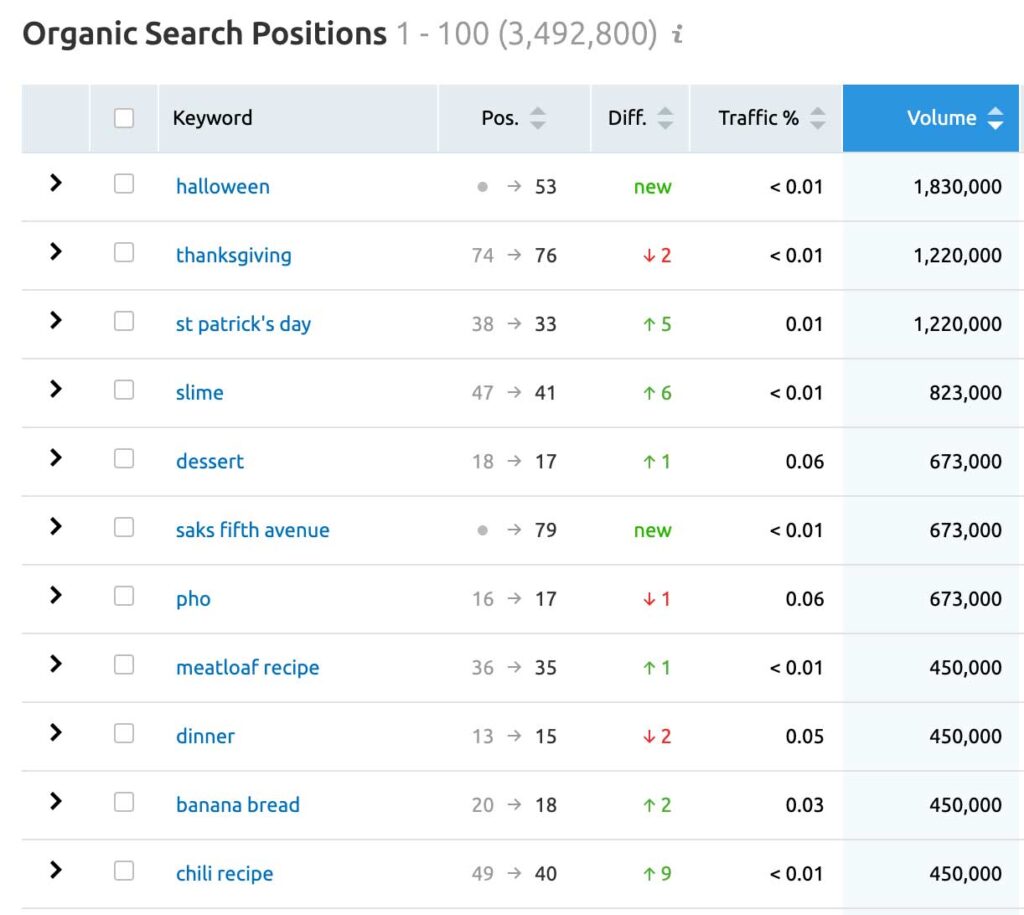
Martha ranks for almost 3 and half MILLION keywords… she is my goddess!
Then I spent a couple of hours recording the ones that I would like to write about and their monthly search queries. (this sucks but is so important to do!)
Then I went into Google to check how many competing sites there were and added those numbers.
Lastly, I did my interest level in writing about that topic on a scale of 1-10 (I don't use this in my calculations, but I tend NOT to write about anything lower than a 7 or 8).
Here is my spreadsheet…
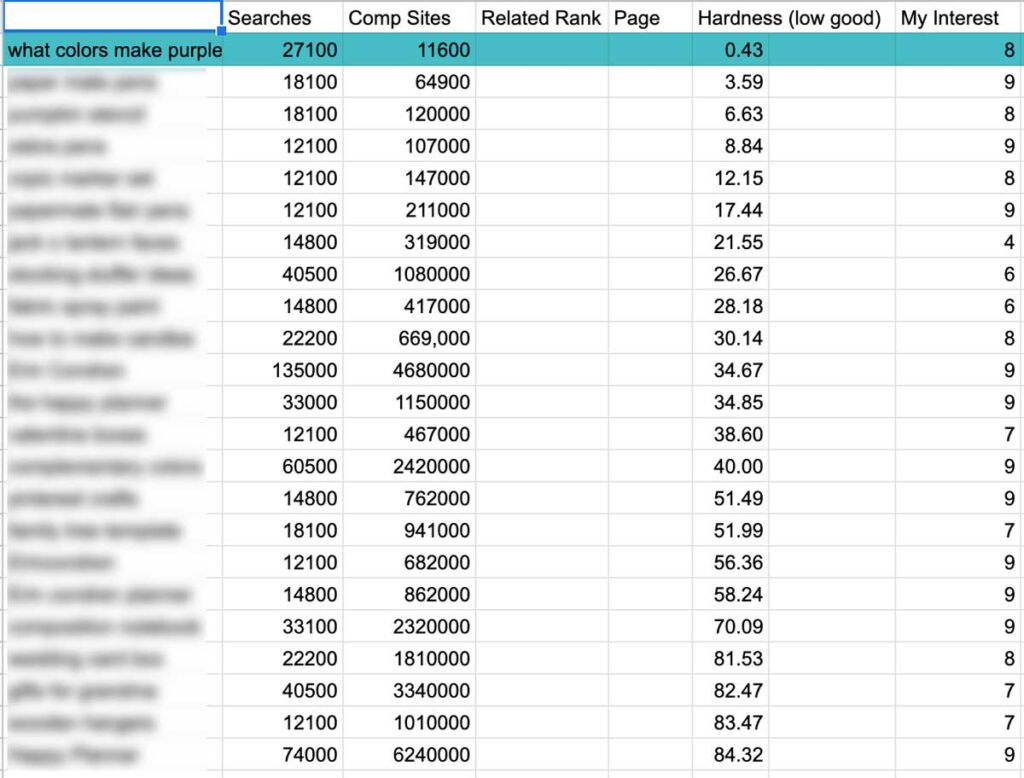
The formula you use is competing sites divided by number of searches (for me this was =C2/B2
This will give you a number. The lower the number the easier it is to rank for that term!
So the first term on my list is “What Colors Make Purple?“. And you can click that link to visit the page on my site where I wrote that post! I will work through that list, roughly top to bottom to try to rank for high volume, low competition keywords!
Just for giggles I went and checked my stats and I am #7 for that phrase… how cool is that for just one piece of content?!? And Google Analytics is actually showing some real live hits to my site already!
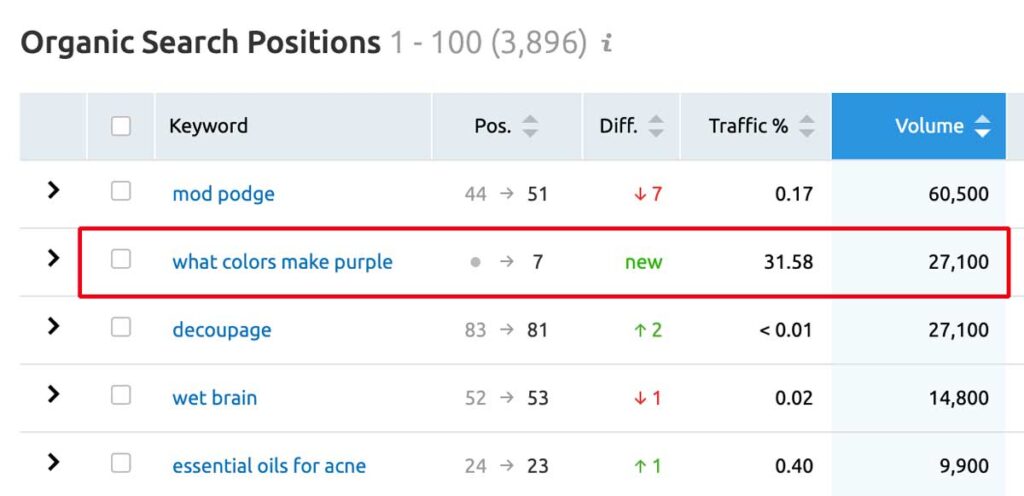
Make sure you link to those posts whenever you can to help them gain traction!
Keyword Tools Used:
SEM Rush – I honestly use this one for almost everything, but you can do it this kind of research in the Google Keyword Planner section of Google Adwords for free too!
Spreadsheet – Nothing fancy need here, just plain old Excel or Google
3. SEO Keyword Research To Get Affiliate Sales
I have been trying to crack the affiliate marketing nut for a while, but after I took Lena Gott's, Money Making Blog Posts course I understood how to find a keyword WAY down the sales cycle that would be good for getting affiliate commissions.
Finding keywords for this is a little backwards because there are no real tools that will tell you “people buy from this keyword”… oh don't I wish there were!
But you can figure it out relatively easily!
For example, I wrote a post about the “no ink Sprocket printer” which was exactly how I would have looked it up while searching.
Lena has a great post about How To Make Your Stinky Car Smell Brand New that sell little air fresheners.
To do this you want to go into Google and look for the questions… for example, these are the questions I went down the rabbit hole of while writing my post about the Sprocket… starting with tiny portable printers
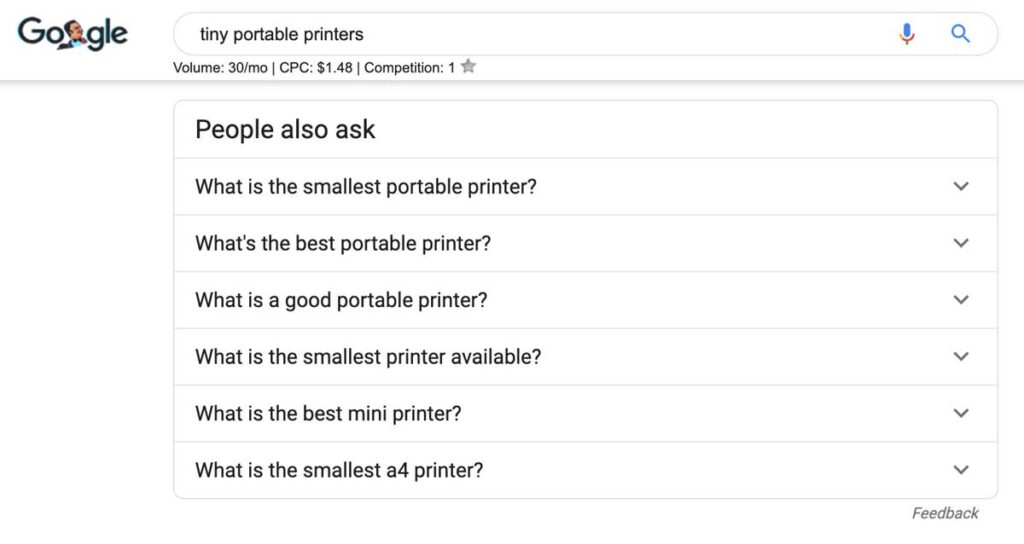
I did NOT want to write about all the portable printers because I only had a Sprocket, but that gave me some keyword ideas. And I kept drilling down until I found the Sprocket mentioned!

Eventually I realized that I was the most interested in the “no ink” part of the printing process and did that rabbit hole to come up with the keywords that I finally settled on!
And here is the proof that it works…

Some random stranger on the internet bought Sprocket photo paper using my link… whoo whoo!
Keyword Research Tools Used:
Google and common sense about what people are searching for
Lena Gott's Money Making Blog Posts course
How To Find Good SEO Keywords Wrapup
I KNOW, there are millions of ways to pick a good keyword to target, but these are the three ways that have worked in the past for me!
None of them are super fancy, but they all can help you rank for keywords that will make a huge difference in the amount of traffic your blog receives from the search engines!

